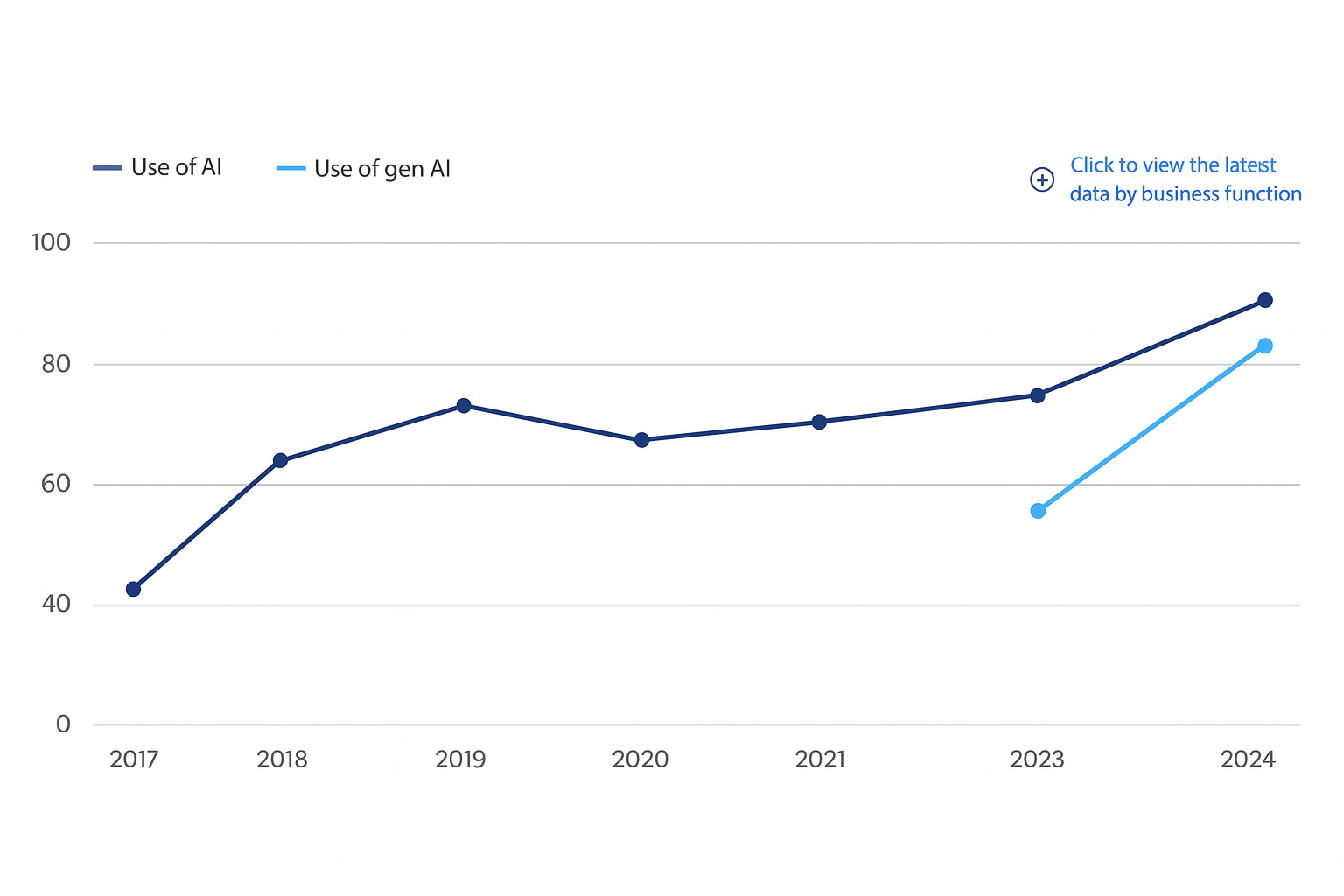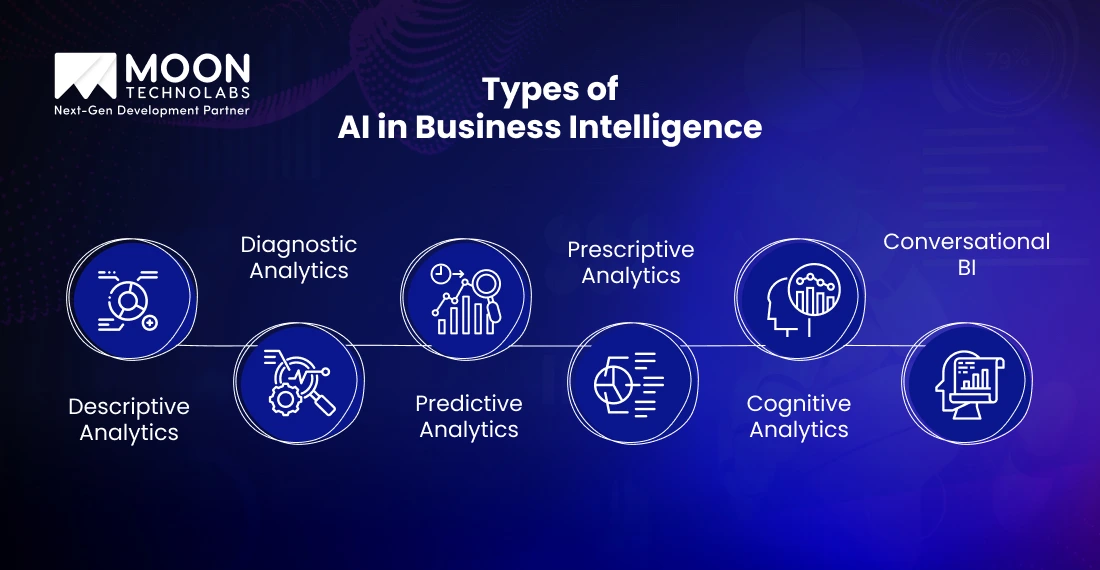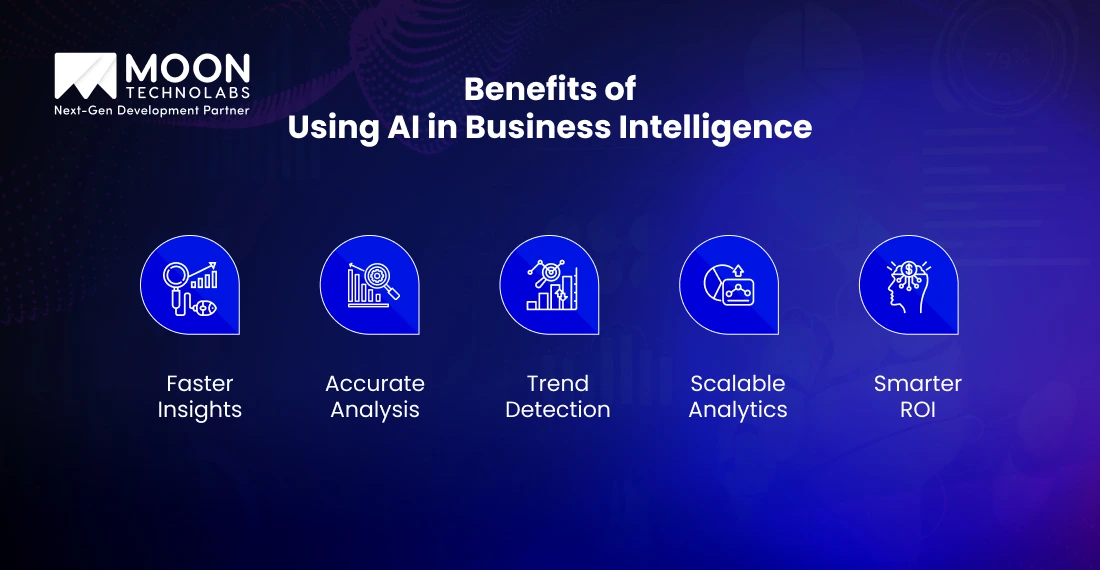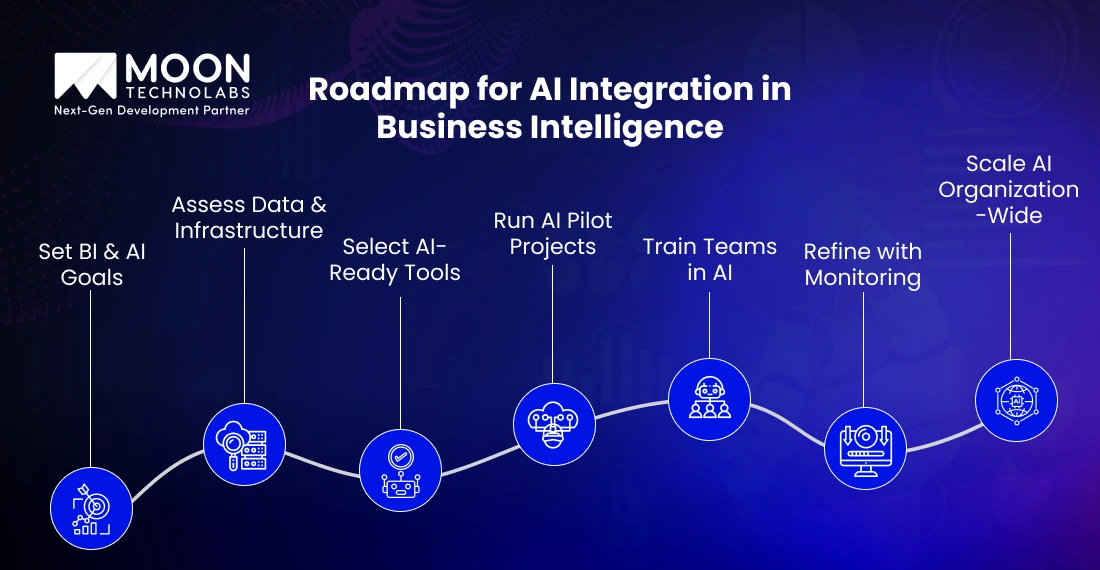Table of Content
Blog Summary:
This blog explains the importance of AI in business intelligence, enabling data-driven decision-making. Whether it’s the types of AI used in business intelligence, crucial components, benefits, features, real-world use cases, or the steps of integration, we cover everything with adequate detail. So, read the entire blog now.
Table of Content
Businesses have increasingly relied on data for various purposes, such as tracking market trends, making informed decisions, and gaining a competitive edge.
Meanwhile, the largest volume of data negatively impacts their traditional business process, which involves manual data collection and reporting. AI in Business Intelligence is the solution to overcome these challenges.
AI in business intelligence enables organizations to make smart decisions based on data. It also helps them develop strategies and improve their efficiency through in-depth insights, real-time reporting, and rapid analysis. AI in BI remains fully actionable and agile, even as data complexity continues to increase.
Due to the above advantages, the majority of businesses nowadays leverage AI in their business function. According to the latest stats, 78% of companies use AI in at least one business operation. In this post, we will delve into the role of Artificial Intelligence in Business Intelligence in more detail.

Artificial Intelligence in BI indicates the integration of different technologies in business intelligence. The technology primarily encompasses natural language processing (NLP), machine learning (ML), predictive analytics, and additional capabilities.
This integration is crucial for enhancing data analysis by automating data preparation, generating actionable insights, and revealing numerous hidden patterns. The process occurs quickly and with greater accuracy.
The fast-growing adoption of AI in BI tools has redefined decision-making through intelligence dashboards, real-time analytics, predictive forecasting, etc.
It enables businesses to make informed and data-driven decisions with minimal human intervention. With the evolution of AI, its role in BI has become important for driving innovation, efficiency, and gaining competitive advantages across multiple industries.

AI has revolutionized the decision-making process through automated data analysis, providing actionable insights that are fully actionable. Let’s discuss several important types of AI used most frequently in BI:
When it comes to descriptive analytics, it serves as the foundation of BI. It harnesses the potential capability of AI to summarize performance metrics, present trends, and historical data. It resolves important queries like “What happened?”
AI resolves this query through automated data cleaning, aggregation, and visualization. It helps businesses analyze KPIs and thus produce a real-time dashboard. It helps them access details of their past outcomes with greater efficiency and speed.
Diagnostic analytics emphasize delving in-depth into data to know a range of reasons behind the final results. It addresses questions like “Why did it happen?” AI-based diagnostic tools resolve queries through data mining and machine learning to identify anomalies, potential corrections, and root causes.
For instance, AI can easily identify the problem, such as the actual reasons behind the dropped sales in a particular region. It achieves this by analyzing seasonal patterns, customer behavior, marketing efforts, and other relevant factors.
Predictive analytics leverages the full potential of AI to forecast future events based on historical data and patterns. It answers questions like “What is likely to happen?”
Businesses resolve this query through various techniques, such as time-series forecasting, regression analysis, or machine learning. These help them predict customer demand, detect equipment failures, and identify fraud, among other applications. It enables businesses to act proactively rather than reactively.
Perspective analytics can take it a step further by recommending actions. It can answer, “What should we do next?”
To answer this question, AI models assist decision-makers in finding optimal solutions by simulating various scenarios and outcomes. AI is highly useful in supply chain management. It has the potential to suggest the top inventory level to match projected demand while reducing cost.
Cognitive analytics combine Artificial Intelligence with human-like understanding. It can imitate human thought processes completely by utilizing technologies such as computer vision and NLP. It works effectively in overviewing unstructured data, including social media, emails, and documents.
Conversational BI enables users to interact with data using natural language. Whether it’s voice assistants or AI-based chatbots, they help users retrieve query data and obtain necessary insights in real-time. Users can ask any questions and get answers quickly.
AI-driven BI has redefined the way many organizations make informed decisions by analyzing data. Many key components are responsible for the same. Let’s discuss some of the important components as follows:
ML algorithms are one of the most important AI-based BI tools, as they process a large volume of both structured and unstructured data. It learns patterns with time, even without explicit programming. These algorithms enable the system to segment data, discover trends, forecast outcomes, and more.
NLP enables BI to interpret and process human language, making data interaction more intuitive. Users can easily query data using natural language, rather than technical syntax, making the process convenient for non-technical stakeholders.
Data mining is essential for extracting valuable insights from vast datasets. When using Artificial Intelligence, this component is necessary to detect relationships, hidden patterns, anomalies, and other relevant information.
Pattern recognition is useful for organizations in tracing fraudulent activities, personalizing marketing strategies, optimizing supply chains, and more.
AI automates the report generation in a real-time dashboard along with tailored reports. These systems minimize manual work and automate the process of updating KPIs, metrics, visualizations, and other relevant data. It gives stakeholders a sense of security, knowing they always receive the latest insights.
When it comes to predictive analytics, they leverage historical data to predict future events such as market demands, sales growth, equipment failure, and more. As far as prescriptive analytics is concerned, it’s a step ahead with recommendations of actionable strategies for optimizing outcomes.
Our team delivers AI-powered BI strategies that turn raw data into actionable insights for smarter business decisions and sustainable success.
Explore AI-Driven BI Solutions

The integration of AI in business intelligence offers numerous benefits, including predictive power, automation, scalable intelligence, and enhanced decision-making capabilities. Let’s understand various important benefits:
Traditional methods for data processing often take more time – it can be even a couple of weeks. On the other hand, AI-based BI tools can process a vast amount of data, even in real-time. AI can easily recognize the most appropriate correlations and patterns, delivering fully actionable insights quickly.
You need to consider that manual reporting, data entry, and analysis are tasks that require a substantial amount of time. Additionally, it also causes numerous errors. AI can automate various tasks, including data collection, sorting, cleaning, and interpretation, with reduced human intervention.
AI detects even those patterns that are not possible for human analysts to identify. It continuously analyzes data streams to identify shifts in customer behavior, emerging trends, potential risks, and other key insights. AI highlights anomalies, including unexpected cost increases and sudden drops in sales.
With the growth of any organization, the volume of its data and complexity also increase. Traditional BI tools struggle to scale efficiently with big data, resulting in delayed reporting and performance issues. Additionally, AI-driven solutions are designed to handle diverse and larger datasets across various formats and platforms.
AI enables businesses to allocate their resources effectively by providing accurate and real-time insights. Whether optimizing supply chains, adjusting marketing budgets, or managing workforce deployment, AI enables data-driven decisions to enhance the efficiency of any organization.
Many important features of AI-based business intelligence are must-haves for any data-centric business. We will discuss the details of every important feature:
AI-based business intelligence has an enormous capability for real-time data processing. This feature is essential for sending quick alerts, especially when performance metrics deviate significantly from the norm. It allows businesses to respond fast to various evolving threats or opportunities.
AI business intelligence platforms unlock the potential advantages of NLP to improve user interaction. It enables users to understand complex query languages and facilitates their ability to raise queries using natural language. Doing this helps them get instant answers in the form of summaries or visualizations.
AI plays a crucial role in generating automated reports and creating insightful visualizations. It also offers recommendations on the most suitable chart types for the data context, auto-generated reports, and key trends, among other features. It minimizes manual work while maximizing the impact and clarity of reporting.
AI algorithms have the capability of detecting even those insights that are not possible for any human being to discern. These include correlations, trends, hidden insights, and other valuable insights.
They can automatically identify anomalies, including unusual customer behavior or a sudden drop in sales, before they become a larger issue.
AI-based BI platforms can determine key performance indicators (KPIs) and send alerts when specific conditions are met. These alerts are intelligent and contextual, in addition to being threshold-based. It operates based on seasonal patterns, historical data, and other factors to minimize false positives.
A personalized dashboard can be adjusted based on the user’s preferences and usage patterns. Artificial Intelligence detects how users interact with data, insights, and report suggestions, and customizes the layout accordingly. These contribute to creating an engaging and efficient analytics experience.
Whether it’s getting marketing insights or planning an efficient supply chain, organizations leverage AI in business intelligence in many ways. Let’s uncover its different use cases:
AI-based business intelligence tools work efficiently in analyzing campaign performance, customer data, and competitor behavior. It makes your marketing strategy more powerful. Businesses have recently leveraged Artificial Intelligence for lead prediction.
AI is also useful for businesses to segment customers based on their purchase history, demographics, behavioral patterns, and other factors. This segment enables hyper-personalized messaging and also product recommendations. Predictive analytics are responsible for predicting future behavior.
AI is also used extensively for fraud detection, as it easily recognizes unusual patterns in transaction data. The banking and finance sectors leverage machine learning models to continuously analyze large volumes of data and identify any suspicious activities. All of these are possible in real-time.
Manufacturers and retailers harness the potential of AI-driven BI tools for various purposes such as managing inventory, predicting demand, optimizing supply chains, and more.
Artificial Intelligence predicts external market conditions, weather trends, and other factors, which helps minimize overstocking or stockouts, predict stock requirements, and enhance supplier coordination.
AI helps businesses improve operational efficiency by enabling them to identify inefficiencies or potential issues. In the manufacturing industry, AI systems analyze machinery performance and predict maintenance requirements to prevent downtime. The technology is also useful for human resources, particularly in optimizing workforce scheduling and resource planning.
In the healthcare industry, AI-enabled BI systems are useful to review patient data, which is necessary to redefine treatment plans, diagnoses, and outcomes. Artificial Intelligence is essential for hospitals to make accurate predictions about patient readmission rates, assess the effectiveness of medical interventions, and optimize staff allocation.
View Project Case Study
Retailers also leverage the potential advantages of AI to adjust pricing dynamics in response to various factors, including competitor pricing, market demand, and consumer behavior. AI predicts demand for a range of products, thereby aiding in stock planning, strategic pricing, discounting, and other related tasks.

The integration of AI in business intelligence requires a fully strategic and structured approach. We will discuss below a complete roadmap of this integration:
You need to be clear about the core business objectives before entering the integration process. You need to decide the outcomes you wish to achieve. Whether you want to enhance customer segmentation, improve sales forecasting, or automate reporting, you need to be clear about your goal.
Since AI operates at its full potential with top-quality data, you need to analyze the available data sources to ensure they are complete, accurate, and highly accessible.
It’s also important to determine whether your existing infrastructure supports AI algorithms and robust analytics. It’s crucial to implement modern data integration tools along with a centralized data strategy.
This step involves selecting the right and cutting-edge BI tools. Ensure you select a tool that integrates seamlessly with your existing systems. They should also support your AI objectives.
While selecting tools, you need to analyze their important features such as integration ability with Python/r /r/r, embedded ML, scalability, real-time data processing, etc.
It’s advisable to start a pilot project before you implement AI with BI at full scale. It’s a great technique to test your integration and know whether it’s successful or not.
You should start the process with a low-risk use case, such as anomaly detection, automated reporting, churn prediction, and other similar applications.
No matter how successful your integration is, it will not deliver the desired outcomes unless you train your teams. Therefore, consider investing in various training programs to upskill your business intelligence teams.
Apart from this, you also need to promote cross-functional collaboration between IT and data scientists.
To maintain higher accuracy and relevance, it is essential to monitor AI models continually. It’s advisable to create a setup loop first – it helps you capture user input, detect data drift, model performance, and more. You can update your models daily with fresh data to boost insights and predictions.
After successful pilot projects, it’s time to deploy the AI integration with all your departments. It’s a good idea to create a centralized strategy for managing deployment, maintaining consistency across the organization, standardizing best practices, and other related tasks.
We specialize in integrating AI into business intelligence seamlessly, catering to businesses that need a perfect solution for informed decision-making. Our team carries out the entire AI integration process with a holistic and proven approach.
We strive to help businesses harness the unparalleled potential of hidden insights with our expertise in custom dashboard development and AI-driven analytics.
With us, you gain tailored AI integration solutions that deliver numerous advantages, including automated workflows, real-time reporting, optimized strategic planning, and more. We are committed to providing scalable yet cost-effective solutions, whether it be natural language processing, AI-driven data visualization, or smart forecasting tools.
Our experts help businesses unlock smarter insights and improved decision-making through AI-driven Business Intelligence solutions tailored to your needs.
Get Started with AI-Powered BI
AI has revolutionized the way businesses utilize data to make informed decisions quickly. It helps businesses get a competitive edge with automation, real-time data processing, and personalized dashboards. The integration of AI into business intelligence is essential for optimizing operations, enhancing ROI, and predicting trends.
Getting in touch with a leading AI development company, such as Moon Technolabs, makes the entire integration process seamless. It allows organizations to leverage their full potential for growth and success.
01
02
03
04
05
Submitting the form below will ensure a prompt response from us.